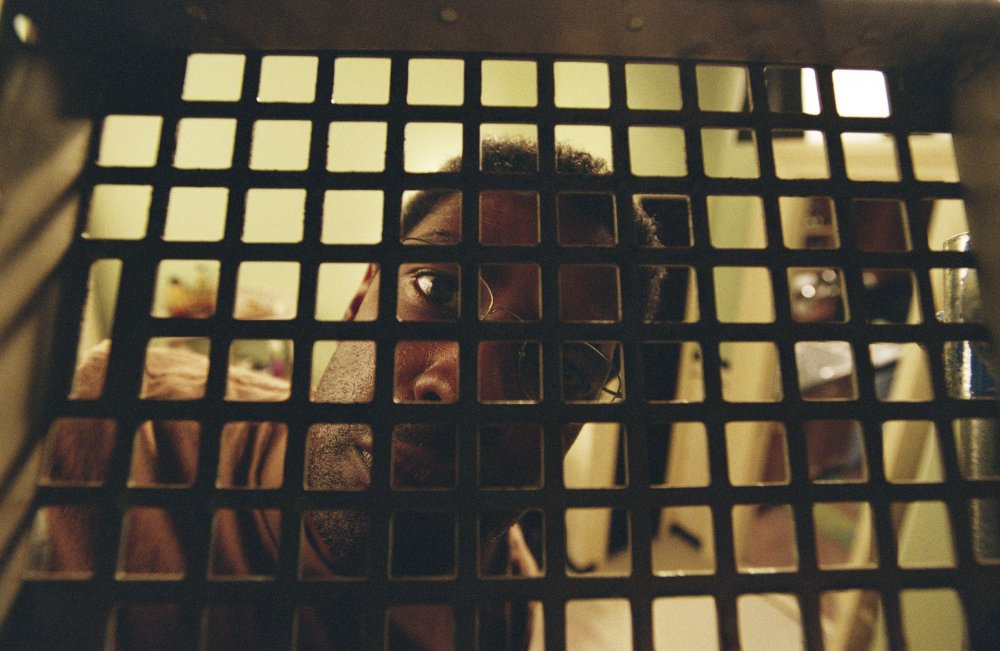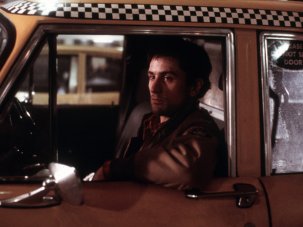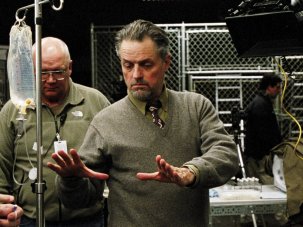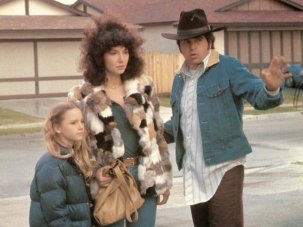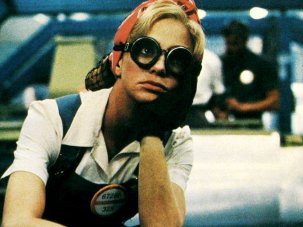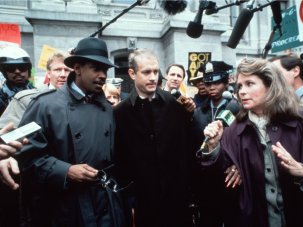When it was announced that Jonathan Demme was to remake the 1962 Cold War classic The Manchurian Candidate many – including myself – thought it a dangerous step after his disappointing revision of Stanley Donen’s elegant 1963 thriller Charade, The Truth about Charlie. Clearly intended as a homage to the French New Wave, Charlie (2002) received arguably the roughest critical and commercial ride of Demme’s career. The original pairing of the charm-laden Will Smith with Thandie Newton might have worked, but when the need for an immediate start to filming led to Mark Wahlberg being cast in the lead, by Demme’s own admission sparks failed to ignite. Would Demme succeed in updating another 1960s classic, this time an apparently unbeatable, subversive take on the American political scene?
In fact, Demme’s new The Manchurian Candidate is his most compelling movie since The Silence of the Lambs (1991), a dizzying reinvention of the original set in an era stretching from the first Gulf War to the present conflict in Iraq. Richard Condon’s novel and the film that came soon after (scripted by George Axelrod and directed by John Frankenheimer) dealt with a platoon, lost in the Korean War, whose men eventually return home convinced that one of their number, Sergeant Raymond Shaw, is their saviour and hero. However, their commander, Colonel Marco, is haunted by a nightmare that they are victims of a brainwashing exercise by a communist conclave, creating in Shaw a puppet who can be commanded – by uncovering the queen of diamonds in a game of solitaire – to carry out a political assassination. The entire cunning plot is revealed to be in the service of his stepfather, vice-presidential candidate Senator John Iselin, a rabid right-winger (modelled on Joseph McCarthy), who is in turn guided by Raymond’s domineering mother.
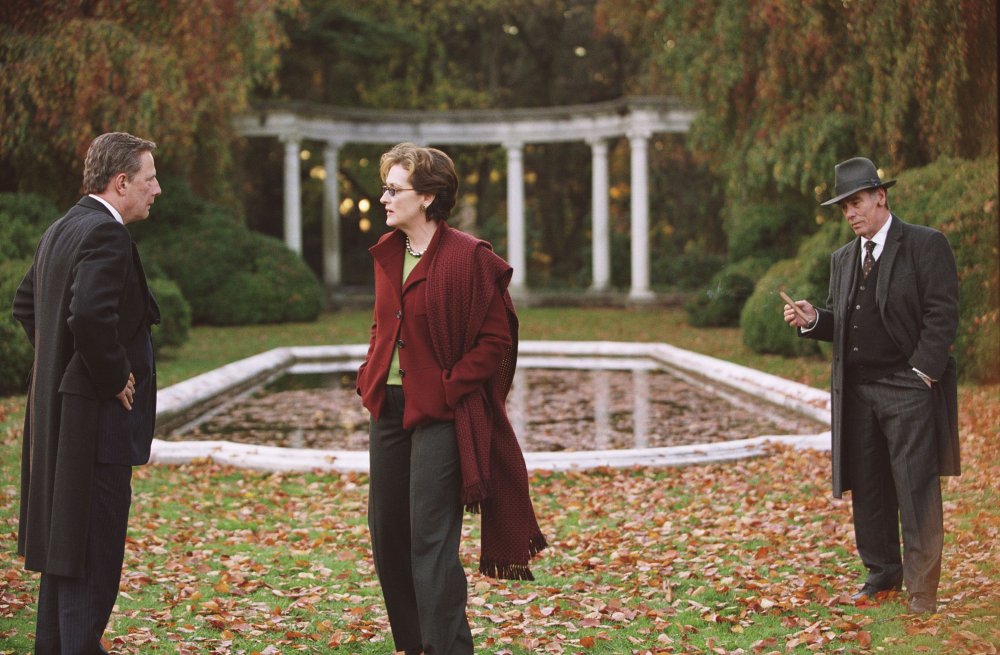
Meryl Streep as Senator Eleanor Prentiss Shaw, with Dean Stockwell (right)
The Frankenheimer film, which opened during the Cuban missile crisis and shortly before the Kennedy assassination, made an indelible impact through its quasi-surrealist ambience and because it presented a fractured mirror image of the politics of its time. Most famously, Marco’s nightmare consists of a daringly long sequence in which the platoon are sitting in a ladies’ garden club that gradually morphs into a clinical demonstration of brainwashing before communist dignitaries. Marco was played by Frank Sinatra, with an air of internalised anxiety, while a haughty Laurence Harvey was well cast as the callous Raymond and a powerhouse Angela Lansbury (only three years older than Harvey) memorably incarnated his appalling mother.
Demme’s version, from a script by Daniel Pyne and Dean Georgaris, follows the structure of the original but makes Marco (Denzel Washington) a more complex figure; Raymond Shaw (an oleaginous Liev Schreiber) becomes the candidate for vice-president and his mother (a diamond-sharp Meryl Streep) a full-blown senator. The soldiers have been plucked from Kuwait and subjected to mind-controlling implants; the manipulators are no longer the Red Menace but a huge, almost invisible corporation called Manchurian Global, seized on by many commentators as an obvious fictional equivalent to Halliburton or the Carlyle Group. Central to the visual and aural mix of an already multi-layered movie is the constant barrage of television coverage of political events and news reports.
With filming over by January this year, Demme worked feverishly with two editors to complete the movie in time for release before the US election in November; in fact it opened much sooner, the day after John Kerry’s nomination as presidential candidate for the Democrats.
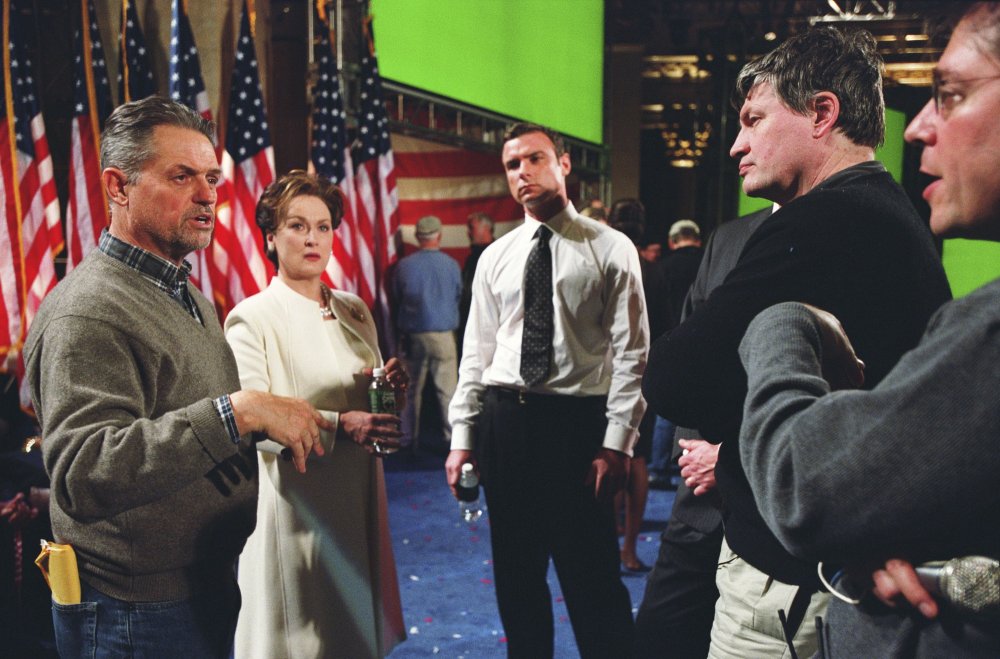
Jonathan Demme (left) with cast and crew of The Manchurian Candidate
David Thompson: The news that you were going to remake The Manchurian Candidate worried people who were not appreciative of your spin on Charade, The Truth about Charlie.
Jonathan Demme: I wasn’t seeking another 1960s classic to get in trouble with. I’d been sent Dan Pyne’s script and Denzel Washington had agreed, so the film was a real project. The original was irrevocably wedded to its time, but I was taken with Dan’s idea of replacing communism as the great global threat to mankind with what is arguably the biggest threat to humanity today: the multinational corporations who profit from war. I also liked the way the script turned the piece back towards the book, playing it more as a psychological thriller and providing the opportunity to engage more fully with the characters.
You’ve said in the past that The Silence of the Lambs was a major influence.
I loved making that movie and I’d always assumed I’d be back with Clarice and Dr Lecter at some future date, but when ten years later Thomas Harris finished his new book, Hannibal, he’d taken the characters in a direction I couldn’t relate to. So I passed, but I still had the desire to do a film like it.
And this was the one – an American movie in which the characters are very well written. The only thing that worried me was that there was still too much residue from the original – they were still using the cards and the extended dream scene. The 1962 movie got away with that because it was the first of a kind, but here we felt that a scene with Raymond strangling somebody surrounded by a lot of technology is enough to haunt a guy for a long time.
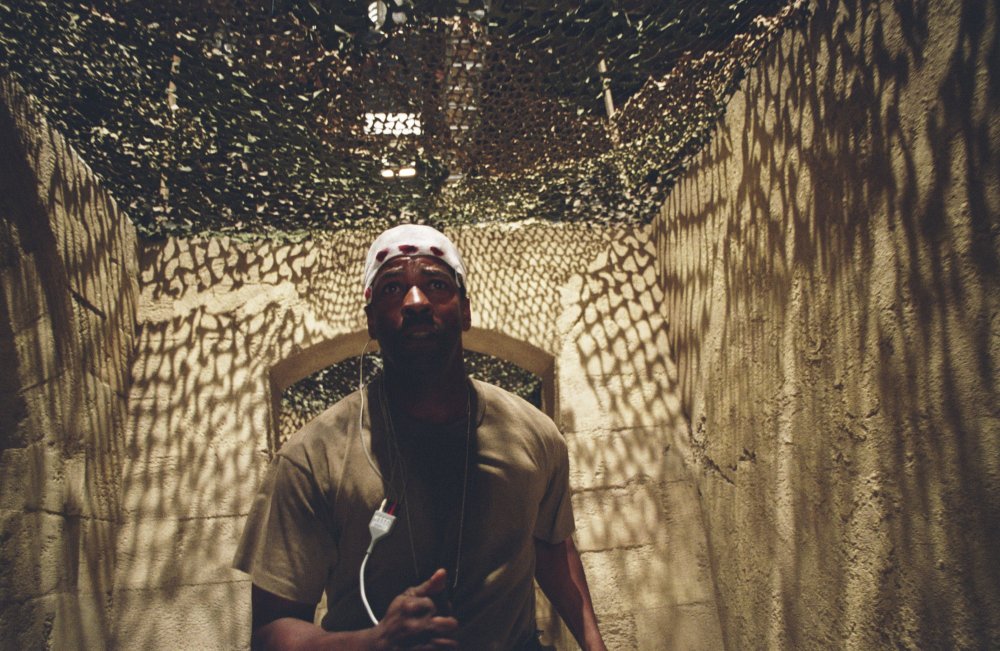
Denzel Washington
Also the ending was just as utterly bleak as in the original version, with Marco saying “Hell, hell”, but under different circumstances. I had the feeling I couldn’t go into this arena and end with a sense of utter hopelessness. I thought it was important to close on a disturbing and haunted note, but we couldn’t watch Denzel go through all this and end up with him behind barbed wire in a desert. So we worked on finding an ending that would allow him to survive, and at the same time give us the opportunity to comment on war and what soldiers are forced to do.
A major change was making Eleanor Shaw a senator rather than a Lady Macbeth figure, with her son as the political candidate.
That kind of fundamental change helped me deal with my fear that people who loved the original would just sit there and watch the new movie unfold as a straightforward remake. Once you cut out John Iselin and make Raymond the candidate it’s a whole new ball game.
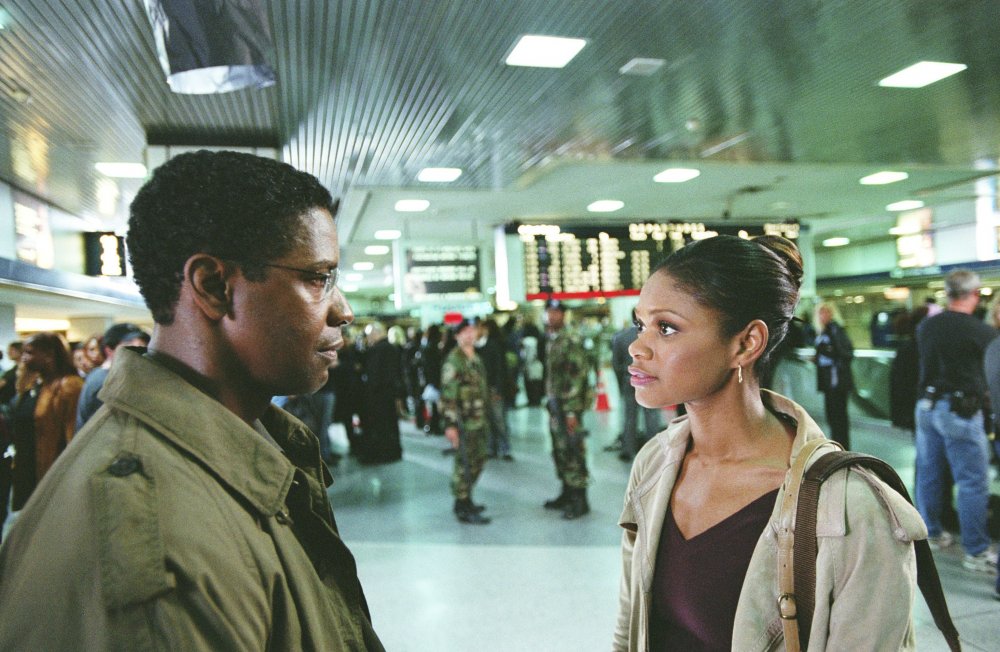
Denzel Washington with Kimberly Elise as Rosie
You also give Rosie [Kimberly Elise] a new dimension – she’s no longer a marginal figure but is directly involved in the course of the investigation.
Dan’s idea was that if Marco is going to have a much more difficult journey, then someone has to function the way Marco does in the original film and be the force of good riding to the rescue. So this became Rosie’s role.
Given that brainwashing was the theme of the original, how did you come up with the idea of brain implants for the new film?
Dan did a lot of research into experiments with implants being done, arguably for dark reasons, by scientific outfits with huge government contracts as well as to help people. The two assistants working alongside Simon McBurney when he performs the operation are actual neurosurgeons, and what we depict is accurate in every way, including – absurdly – the drill. I was hoping we could achieve a sense of the film being just in the future, which is how we found ourselves reading about genomic reconstruction. Currently – as best we know – this is being done only on an embryonic level, but a guy like Dr Noyle would be too impatient to wait for genomic reconfiguration in 20 or 30 years: he’d want to get into adults and try to reconfigure them, so he’s using a combination of disciplines to create this Manchurian candidate.
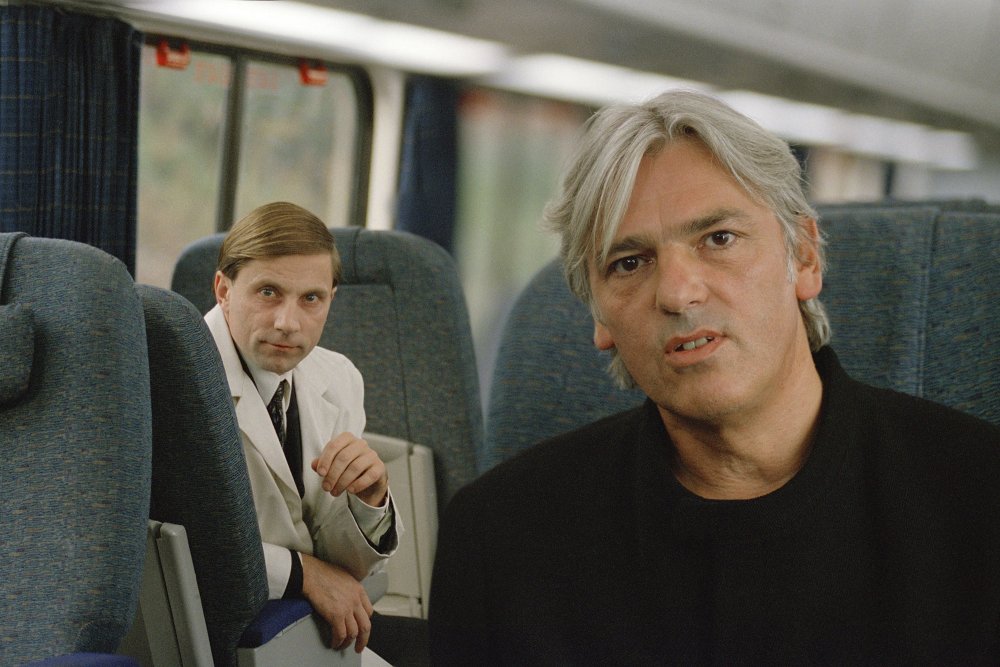
Simon McBurney as Doctor Atticus Noyle and Robyn Hitchcock as Laurent Tokar
I enjoyed the yin and yang of the rogue scientists. What led you to cast two distinguished European theatre actors?
I felt it was important to have someone other than the usual American reliables one might tum to. So I came to London for a few days of casting and met Simon McBurney, whom I was not familiar with. In his work for Theatre de Complicite Simon is clearly very involved with the workings of the mind, with perception and reality, and he seemed obsessed with that stuff. I thought to myself, “This is what it would be like to talk to Dr Noyle,” so I was taken with him immediately.
We don’t really know where the other scientist, Delp, comes from, or where he goes – though I have my ideas about that. His job in the movie is to provide a lot of disturbing information and he’s the one Marco turns to in his desperate choice to have some investigations of his own done. I thought we needed someone who could bring a whole life story into the movie, that old-European gravitas, so I decided to try Bruno Ganz, who was just finishing playing Hitler in Downfall. Denzel is a very demanding actor and every time we got together to prepare this movie he would say, “Get me actors, Jon, get me people to work with who are going to give me stuff.” To be in the same room with Denzel Washington and Bruno Ganz was very stimulating.
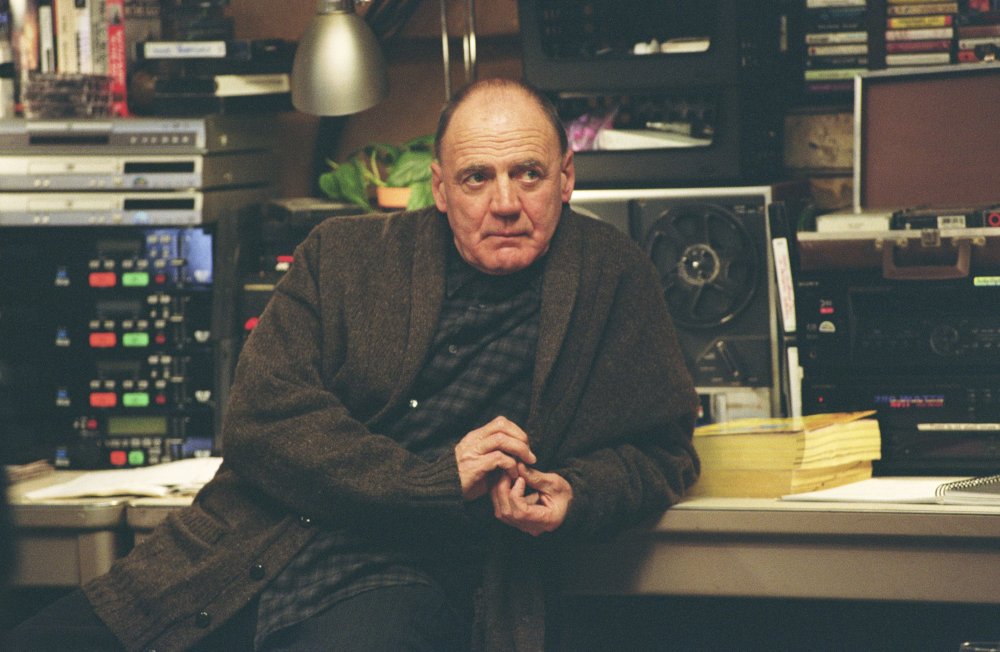
Bruno Ganz as Richard Delp
Watching Meryl Streep’s performance, I found it hard not to think of Hillary Clinton.
Meryl’s original ideas of what she wanted to look like were far removed from the Eleanor we ended up with. We tested a few flamboyant looks, but I felt very strongly I didn’t want Eleanor to be simply a one-dimensional villain or a dragon lady. Arguably there’s no character Meryl has ever played who is so completely removed from who she is as a person, yet we were able to capitalise on some of her real-life characteristics: how rampantly smart she is, and how sexy and charismatic. When Meryl Streep enters a room everybody quiets down a little, so we went back more and more to a relatively natural look. Meryl has said she has studied male power figures a lot, and she was using what she’s observed of people in high office or with tremendous wealth. A lot of energy also went into being a mother who adores her child to a damaging degree.
The one scene that seems very close to the original is when Eleanor kisses Raymond.
I started watching Frankenheimer’s film again when I first got involved in the remake but after about 20 minutes I stopped because I found it was confusing me. But I do remember from when I last saw the movie about eight years ago how shocked I was by that kiss.
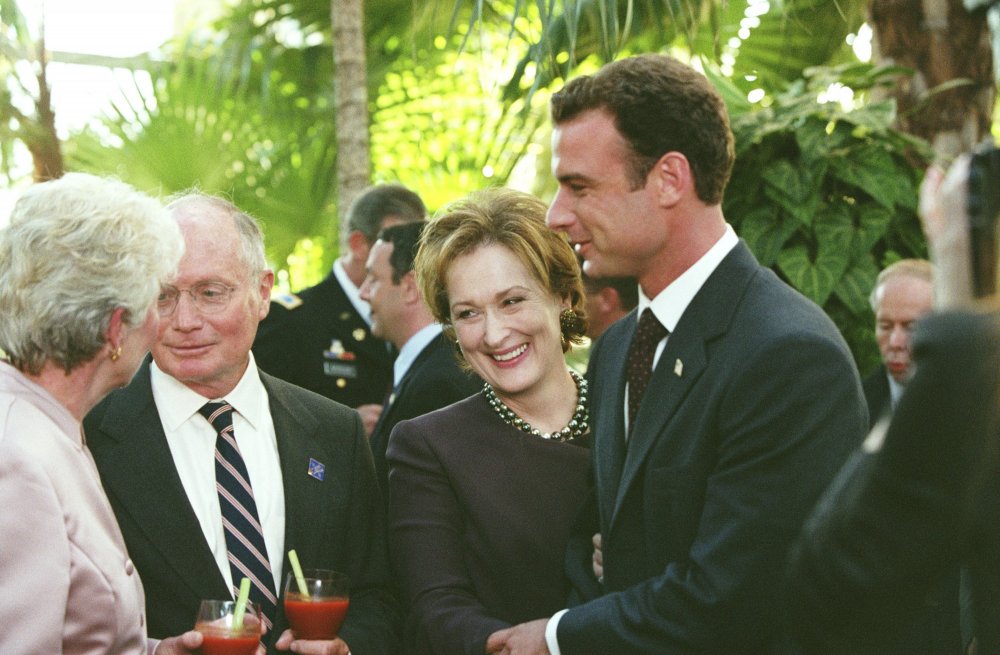
Meryl Streep and Liev Schrieber as war hero and vice presidential candidate Raymond Shaw
Perhaps the way it was shot was lurking somewhere in your subconscious?
I guess so. I don’t know. I think my contribution was to get them in the bathroom dressed only in robes and towels and to make it very bright and to let them do their stuff. When a mother moves in for too lingering a kiss with her grown-up child we’re in a zone that people are bound to find disturbing. You should hear American audiences during that scene – it’s unbelievable.
A strong component of the film is the constant noise of the media invading the minds of the characters.
American media are like that. We wanted to present the political material like sports coverage and we hoped to be nicely over the top – for instance, by having all the firemen, soldiers and jet pilots up on stage at the victory party – though the recent conventions show us we’re closer to reality. Living in New York, we are terrified of attacks so we hate to hear the news, yet we’re always listening to it. So it seemed we couldn’t provide a moment’s relief from the media onslaught of disturbing information. I’m sure the reason Richard Condon wrote the book was his outrage at the way the powers-that-be back in the 1950s were using fear to brainwash the population into submissiveness. And we have a very similar thing going on today, if anything broader and cruder. We were changing the newscasts right up to the final mix, desperately trying to stay in the moment, having long abandoned hope of being ahead of the curve.
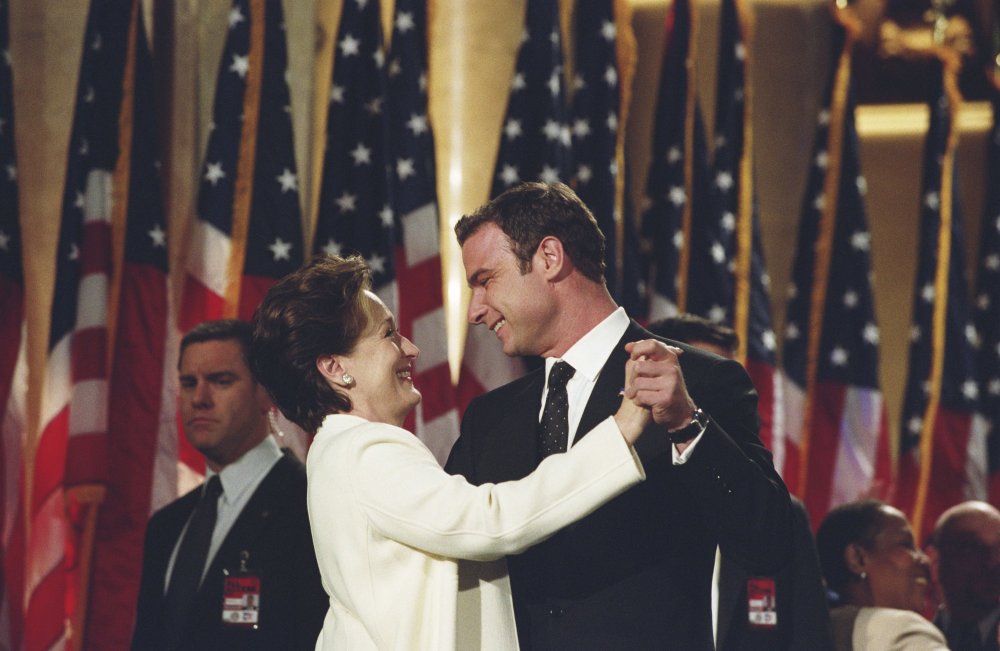
Meryl Streep and Liev Schrieber
You never mention whether Raymond is a Democrat or a Republican.
The last thing we wanted was to endorse one of the big parties. In America there’s a strong feeling of frustration that this two-party system is in fact more like one big fat party with two different sides. So we didn’t want to show the movie’s disrespect for the establishment as coming from any party line.
But many have read Shaw as a Democrat.
Eleanor is clearly extremely conservative and it would appear that Raymond is treading in the populist footsteps of his late father. At the same time, he is being used as a pawn to play into the fear that will make people swing with Eleanor’s more conservative view. So in his big convention speech he presents himself as someone who has faced the enemy first hand, living proof that he can triumph.
We didn’t at the time know that there would be such a fuss over John Kerry’s war record. But what heightened our sense of responsibility was that within weeks of finishing filming Iraq was invaded. That really ratcheted up our sense of needing to make a film that portrayed soldiers in a way that was meaningful today.
The main criticism of the film seems to be that since everyone knows business interests control politicians, where’s the conspiracy?
There’s a moment where Jon Voight as Senator Jordan says Raymond is being groomed to be the first fully owned and operated vice-president in the US. It always makes me want to shout out: “What do you mean? We have that already.” For me, the movie plugs most into Dick Cheney, someone who made millions by being at the top of a multinational corporation that profits from war, then left to take up the second-highest office in the land. He enters this new office with a ferocious war agenda and helps lead the country and the world into a horrendous war from which the company he was involved in profits at untold levels. In this movie, I’ve tried to ask the questions: “Is this OK? Is there something morally wrong with this?” And I firmly believe there is something profoundly wrong with this – it takes the notion of conflict of interest into an Armageddon dimension – but infuriatingly no one is talking about it. It’s one of the things the movie wants to be provocative about, along with the exploitation of soldiers – bodies for billions.
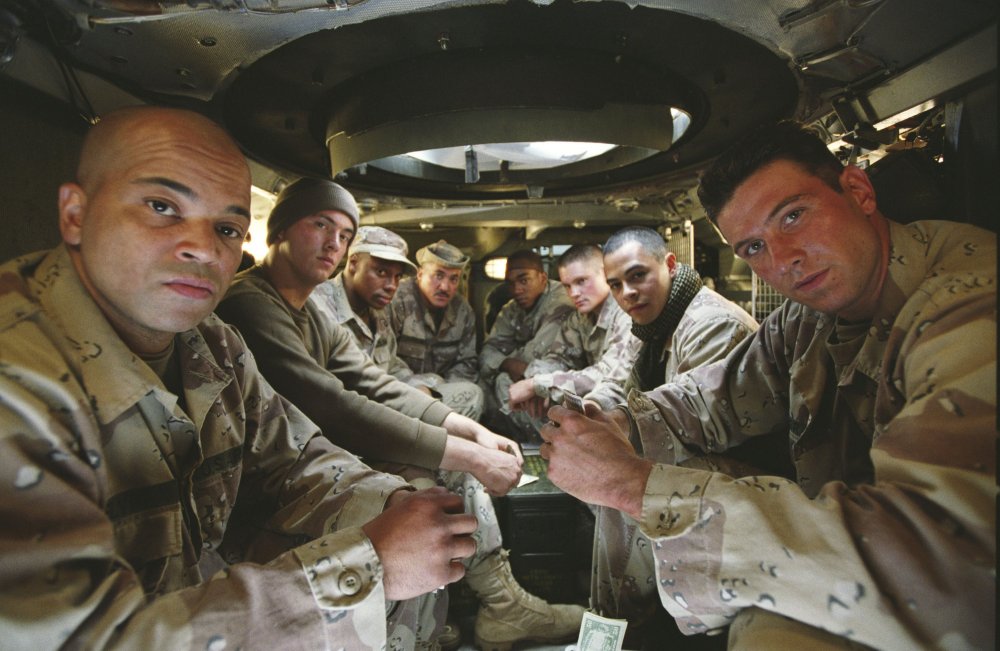
Jeffrey Wright (left) and fellow soldiers from Shaw’s platoon
The level of debate in the US media is unbelievably low and we enjoyed showing the free press – the cornerstone of democracy – as an entertainment industry. One of my favourite lines is when the counter-conspiracy has lobbed a couple of smart bombs into the corridors of Manchurian Global using former employees as assassins. The newscaster says that another former employee was arrested and the authorities are pursuing any other links that might exist. In other words, it’s not the media who is pursuing it – they’ll report what the authorities tell them. So our anger isn’t a copycat, recycled anger from Richard Condon’s book or Frankenheimer’s movie: there’s a lot to be enraged and frightened about today, and our film has plugged into that. I think we’ve made a good time-capsule movie, in the same way as the earlier film was a time capsule of the 1960s.
Do you regard your film as a close relative of Fahrenheit 9/11?
I’d like to think we’re cousins. I have a huge respect for and gratitude to Michael Moore, and whether or not he gets every single fact straight, I think his film is a profoundly important piece of work. But what’s missing is a Fahrenheit 9/11 about Kerry – I’m not sure exactly what it would be, but I wish it was in circulation too.
Has The Manchurian Candidate had any appreciable political impact?
It’s made it off the entertainment pages, and I’ve received letters from students saying they now see things differently. I know movies can change how a person feels because of the way my own perspective altered when I went to see Far from Vietnam in 1967. I entered the theatre a young American guy terrified of being drafted but ready to go if my country called me, and after the Alain Resnais section I came out thinking the war was all wrong. One week later I was down in Washington at the protest.
Of course, The Manchurian Candidate is a thriller – Paramount made it because they hoped it would be a really frightening Denzel Washington psychological thriller – but if it provides some food for thought as well, that’s terrific. It opened in the US in the summer and I believe it’s going to play through election day, which should be in its favour.
Jonathan Demme in the Sight & Sound archive
Get access to our digital archive for more of our writing about the films of Jonathan Demme, including:
Caged Heat
Review: Monthly Film Bulletin December 1975, page 258
Crazy Mama / Crazy Ladies
Review: Monthly Film Bulletin April 1981, pages 64-65
Fighting Mad
Review: Monthly Film Bulletin August 1976, page 165
Citizens Band
Review: Monthly Film Bulletin November 1978, page 216
Last Embrace
Review: Monthly Film Bulletin November 1980, page 216
Melvin and Howard
Review: Monthly Film Bulletin April 1981, page 72
Swing Shift
Review: Monthly Film Bulletin December 1985, pages 390-391
The Perfect Kiss
Review: Monthly Film Bulletin September 1985, page 295
Something Wild
Feature: Sight & Sound Winter 1986/87, pages 30-31 (considered with True Stories and Blue Velvet)
+ Review: Monthly Film Bulletin July 1987, pages 217-219
Swimming to Cambodia
Review: Monthly Film Bulletin September 1987, page 284
Married to the Mob
Review: Sight & Sound Summer 1989, pages 210-211
+ Review: Monthly Film Bulletin July 1989, pages 209-210
The Silence of the Lambs
Review: Sight & Sound June 1991, pages 53-54
+ A.L. Kennedy column: Sight and Sound June 1995, page 34
Philadelphia
Review: Sight & Sound March 1994, pages 45-46
Storefront Hitchcock
Review: Sight & Sound January 1999, pages 57
Beloved
Review: Sight & Sound March 1999, pages 34-35
The Truth About Charlie
Review: Sight & Sound August 2003, pages 60, 62
The Manchurian Candidate
Review: Sight & Sound December 2004, pages 55-56
Rachel Getting Married
Preview: Sight & Sound November 2008, pages 24-32
+ Review: Sight & Sound February 2009, pages 69-70
Ricki and the Flash
Review: Sight & Sound October 2015, page 95
-
The Digital Edition and Archive quick link
Log in here to your digital edition and archive subscription, take a look at the packages on offer and buy a subscription.




